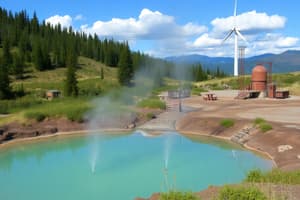Podcast
Questions and Answers
توليد الطاقة الحرارية الأرضية من الحرارة الناتجة عن النشاط الشمسي Dış
توليد الطاقة الحرارية الأرضية من الحرارة الناتجة عن النشاط الشمسي Dış
False (B)
تستخدم الطاقة الحرارية الأرضية الماء البارد من تحت الأرض لانتاج الكهرباء
تستخدم الطاقة الحرارية الأرضية الماء البارد من تحت الأرض لانتاج الكهرباء
False (B)
CanBe熱ة 地球内部热用于生产电力
CanBe熱ة 地球内部热用于生产电力
True (A)
نظام الجيوتيرمال التрадиعي يستخدم الماء البارد لانتاج الكهرباء
نظام الجيوتيرمال التрадиعي يستخدم الماء البارد لانتاج الكهرباء
تنتج الطاقة الحرارية الأرضية غازات الاحتباس الحراري
تنتج الطاقة الحرارية الأرضية غازات الاحتباس الحراري
الطاقة الحرارية الأرضية مصدر طاقة مستدام ومتجدد
الطاقة الحرارية الأرضية مصدر طاقة مستدام ومتجدد
النسبة الإنتاجية لمرافق الطاقة الحرارية الأرضية منخفضة
النسبة الإنتاجية لمرافق الطاقة الحرارية الأرضية منخفضة
تستخدم الطاقة الحرارية الأرضية في أي مكان في العالم
تستخدم الطاقة الحرارية الأرضية في أي مكان في العالم
Flashcards are hidden until you start studying
Study Notes
Geothermal Energy
Definition and Principle
- Geothermal energy is a form of renewable energy generated from the heat of the Earth's interior.
- It uses heat from hot underground water or steam to produce electricity.
How it Works
- Hot water or steam from underground reservoirs is pumped to the surface.
- The heat is used to power a turbine, generating electricity.
- The cooled water is then re-injected into the ground to maintain the reservoir's temperature.
Types of Geothermal Systems
- Conventional: Uses hot water or steam from underground reservoirs to generate electricity.
- Enhanced Geothermal Systems (EGS): Artificially creates fractures in hot rock formations to access hot water or steam.
- Binary Cycle: Uses the heat from hot water to produce steam, which then drives a turbine.
Advantages
- Renewable and sustainable: Geothermal energy is a clean and renewable source of energy.
- Reliability: Geothermal power plants can operate at a high capacity factor.
- Low emissions: Geothermal energy produces little to no greenhouse gas emissions.
Challenges and Limitations
- Location-specific: Geothermal energy is only viable in areas with significant geothermal resources.
- Exploration and development costs: High upfront costs for exploration and development.
- Technical challenges: Drilling and maintaining wells in hot, high-pressure environments.
Studying That Suits You
Use AI to generate personalized quizzes and flashcards to suit your learning preferences.




